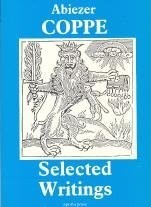Having loved Abiezer Coppe’s ‘Fiery Flying Rolls’ in The Mad Crew, I was keen to read more and so purchased his Selected Writings.
It starts with an interesting introduction, featuring as full a biography of Coppe as is possible, much of it coming from the work of Anthony Wood (who appeared as a narrator in the fiction, An Instance of the Fingerpost). A riotous student in Oxford, he became sucked into the more anarchistic side of new religious movements and eventually became one of the key figures in the very loosely organised ‘ranter’ group. He preached around the Midlands, often drunk, preached wildly on the south side of the Thames and then was accused of entering Coventry with two women sharing his bed. There he was arrested before being sent to Newgate in London, which he was let out of on the condition that he retracted his previous views. On his release, he seems to have carried on his preaching in London, and then setting up a conventicle in Barnes under the name of Dr Higham, where he died.
The book then starts with the two ‘Fiery Flying Rolls’. Despite having read them a couple of days before in the other anthology, I read them again. There’s a power in the writing, drawn from deep passion, deep anger at the rich and the corrupt and a deep glee at seeing them ‘get it’ when Christ inevitably (and shortly) returns again. They are also great writing. Coppe’s use of rhythm, alliteration and repetition is amazing. From that beginning,”My dear one/all or none/ everyone under the sun/ mine own” to the “unity, universality, universality, unity”, the text just flows.
I love the savageness of it, his “plaguey, filthy, nasty holiness”, that threatens the uncaring rich with “being served in thine own sauce” and accuses them of being elbow deep in others blood that even soap won’t wash off. I love his insistence that the poor are the same flesh as the rich and deserve love. That real communion is not an act of ritual but one of sharing. As he says, “I am about my act. My strange act. And when you hear of it, your ears will tingle.” It’s thrilling stuff.
Then we get to his ‘Remonstrance’, the text where he has to officially retract the things he said and wrote. He starts off by claiming that his works can’t fall under the new blasphemy laws, because those laws were written in response to his work - that they couldn’t be against the law if the law was written afterwards.
He says that there have been lies told about him, like taking two women to Coventry, that he parroted blasphemies when he was under other people’s influence but not since he achieved his own spiritual maturity. He claims many people have cited them the father of their babies and that he has accepted them, not because he was, but because to spurn them would be to starve innocent children.
He makes a point that God has often changed his mind. That he is not into circumcision as he used to be, that he used to set challenges for favourites, like telling Hosea to marry a prostitute. He denies he ever said God was in people (though he certainly did say that) instead saying that God is one with everything.
He claims that he never swore until he was twenty-seven and that he is big enough to be “neither offended by my weak brother, which eateth herbs. Nor judge my strong brother, which eateth meat.” He also says that he never denied the existence of sin, but feels it a rank hypocrisy to go after the sin of drink and not the sin of ignoring the poor.
The whole piece is a retraction, but it then also pushes forward on the things he really cares about. When it does come across as grovelling, it comes across as arch and insincere and then strikes back in full vigour when he can attack the christians who care more for form than charity. I’m surprised and worked and he was released from prison. An imprisonment he typically defines as ‘tedious’.
There are two short pieces in there as well. One in a poem about a true Christian, which sounds pretty orthodox. The other is called ‘Divine Fireworks’ and is something of a mini return to form. Not only does it use fire imagery but it’s an apocalyptic vision. The repeated phrase in it is, “It’s a whipping time. The day burns like an oven.” Perhaps the authorities weren’t so worried about Coppe then, perhaps the meaning is suitably clothed in the allegory of the vision or perhaps it simply didn’t sell, but Coppe didn’t get in trouble for it.
The back cover features a warning from the ‘Rolls’, “Read it through, and laugh not at it; if thou dost I’ll destroy thee, and laugh at they destruction.” That said, Coppe can easily be read for entertainment. Obscure 400 year old religious pamphlets aren’t an obvious good read, but Abiezer Coppe’s are and more people should read them.



No comments:
Post a Comment